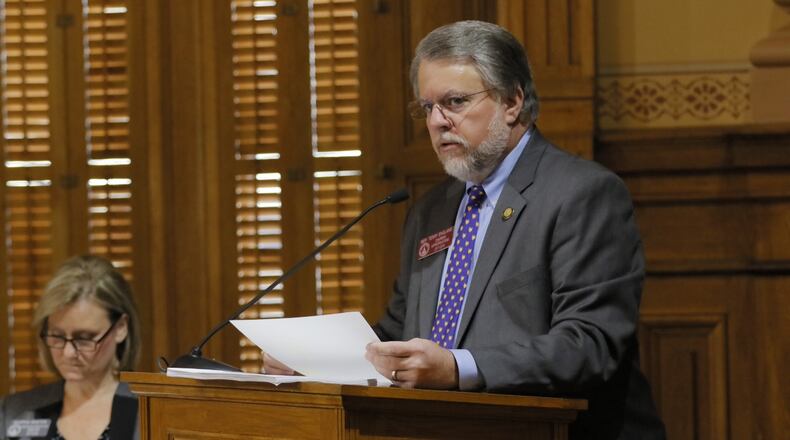Legislative leaders reached a final deal on a budget for the upcoming year that includes pay raises for thousands of teachers and state employees and clears the way for the end of the 2017 General Assembly session.
The deal on the spending plan for fiscal 2018, which begins July 1, was signed Tuesday and could be voted on by both chambers as early as Wednesday.
The 2017 session is scheduled to end March 30. Since House Bill 44, the budget, is the only thing legislators must approve by law, it opens the door for an early exit.
"I don't know what's out there that's important enough to stay," House Speaker David Ralston, R-Blue Ridge, said late last week. "I'm sure we're likely to find something."
With four working days left in the session, legislators are trying to win final passage of dozens of bills, ranging from a measure that would allow Georgians to carry guns on college campuses to legislation that would give yacht owners a tax break if they get their mega-boats repaired in Georgia.
But for legislative leaders, the budget was always the big target, a bill that typically doesn’t get resolved until the final few days — and sometimes the final hours.
Both the House and Senate earlier approved versions of the budget that largely follow what Gov. Nathan Deal proposed in January.
The record spending plan tops $49 billion when federal and other funds are included. State tax money totals $25 billion.
The state budget helps fund the education of more than 2 million students and provides health and nursing care for about 2 million Georgians. The state funds road improvements and prisons, economic development initiatives and cancer research, business and environmental regulation, parks and water projects. It creates thousands of private-sector jobs through construction projects.
Before signing the deal worked out by House and Senate leaders, House Appropriations Chairman Terry England, R-Auburn, said, "I think we've done some really good things for 10 million-plus Georgians that will have a meaningful impact."
Senate Appropriations Chairman Jack Hill, R-Reidsville, said the budget includes a $123 million increase in health and social service programs for children, the elderly and disabled, not including extra funding for Medicaid, the state-federal medical program for the poor and disabled.
The budget would provide 2 percent pay increases for teachers and most state employees, while child protection workers would receive raises of 19 percent. The raises would cost the state about $360 million. Retired state employees would get a 3 percent one-time bonus, as they did last year.
Teachers in some districts got a 3 percent, one-time bonus last year rather than a raise. Because next year’s raise is 2 percent, they could wind up earning less in the 2017-2018 than they did this year, when they got the bonus.
The spending proposal includes more than $1.15 billion in new borrowing. High on the list is $105 million to build a new state courts building in Atlanta on the site of the former archives building, which was brought down earlier this month.
The bond package also includes $73 million more to complete a new technical college campus in Deal's home county of Hall.
Deal had added $10 million to the budget in 2015 to buy the land and $48.3 million last year to get the construction started. Combined, if given final approval as expected, the state will have borrowed more than $130 million to move Lanier Technical College from one end of the county to the other and create a new campus.
Under the budget, doctors and dentists will receive an increase in payments for treating Medicaid patients, and millions more will go to increasing autism services for children in the program. Nursing homes will get more to care for the elderly. More than $4 million was added for a state Alzheimer’s disease project.
The budget for the upcoming year includes $223 million to help keep the state's Teachers Retirement System on strong financial footing. State officials said the payment is one of the largest subsidies — if not the largest — in the program's history.
The proposal adds $2.8 million for the state to pay for cyber insurance, which covers the government when it has data breaches.
State leaders also added $2.2 million to hire a "chief turnaround officer" and help underperforming schools. The money is meant to help implement House Bill 338, the state's latest attempt to help low-performing schools.
Last year voters rejected Deal's referendum to give him authority to take control of "chronically failing" schools. HB 338 is still working its way through the General Assembly.
Legislative session coverage
The Atlanta Journal-Constitution has the largest team covering the Georgia Legislature. To see more of its legislative coverage, go to http://www.myajc.com/georgia-legislature/. To track particular bills and resolutions, check out the Georgia Legislative Navigator at http://legislativenavigator.myajc.com/. You can also follow the proceedings on Twitter at http://twitter.com/GAPoliticsNews or on Facebook at http://facebook.com/gapoliticsnewsnow.
Subscribe to our newsletter for more news about Georgia politics. Subscribe to politics news alerts in the AJC news app.
About the Author
Keep Reading
The Latest
Featured




